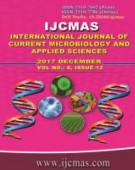


 National Academy of Agricultural Sciences (NAAS)
National Academy of Agricultural Sciences (NAAS)

|
PRINT ISSN : 2319-7692
Online ISSN : 2319-7706 Issues : 12 per year Publisher : Excellent Publishers Email : editorijcmas@gmail.com / submit@ijcmas.com Editor-in-chief: Dr.M.Prakash Index Copernicus ICV 2018: 95.39 NAAS RATING 2020: 5.38 |
This study was aimed at investigating the association of dietary and serum cholesterol levels with active tuberculosis. A hospital based matched case control study was conducted. A total of 124 participants (62 pulmonary tuberculosis (PTB) cases and 62 controls) were included in the study. Out of 62 PTB cases 28 were newly diagnosed while the rest 34 cases were under anti-tubercular treatment (ATT). Serum lipid and albumin levels were measured from blood samples. Dietary intake of cholesterol before disease was assessed by a validated food frequency questionnaire (FFQ). Smears prepared from sputum samples of the newly diagnosed cases were graded for acid-fast bacilli after Ziehl-Neelsen staining. Levels of serum total cholesterol (TC), low density lipoprotein cholesterol (LDL-C), high density lipoprotein cholesterol (HDL-C), triglycerides (TG) and albumin were significantly lower in the newly diagnosed cases when compared with the controls (p<0.000) and the cases under treatment (p<0.000). TC, HDL-C and dietary cholesterol intakes differed significantly between categories of smear grades with p-value of 0.019, 0.011 and 0.006 respectively. Levels of Serum TC, HDL-C and LDL-C correlated negatively with the smear grading with spear man rho of -0.514, -0.398 and -0.424respectively at p<0.05. Reported habitual intake of cholesterol before disease also correlated positively with the smear grading (r=0.561 for new cases at p<0.05). There was a significant positive trend in the risk of developing active disease between quartiles of cholesterol intake with Ptrend = 0.008. Low serum cholesterol in the new cases and its negative correlation with smear grading may be due to high oxidative stress and elevated cytokines reported in previous studies but levels of dietary cholesterol intake before disease may have a role in fueling the development of active disease and should be thoroughly studied.
 |
 |
 |
 |
 |